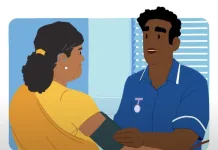Figures today show the number of coronavirus cases in the UK continues to rise.
Meanwhile the NHS has declared to prepare for a ‘level four’ incident for coronavirus – meaning the highest levels of emergency preparedness is in place.
Under the level four alert, all hospitals in England have been told to “assume that they will need to look after COVID-19 cases in due course”.
In the event that the outbreak is declared a pandemic, Health Secretary Matt Hancock has said he will guarantee volunteers will have their permanent jobs protected for a month by legislation which will reach the Commons this week.
Were you planning to travel? Here’s what you can do: https://www.asianexpress.co.uk/2020/03/coronavirus-what-you-can-do-if-you-want-to-cancel-a-trip-and-how-to-stay-safe/
The government and health officials are currently attempting to contain the spread of coronavirus and hope to push the worst of an outbreak into the summer months, when there is less pressure on NHS services.
A four-stage plan includes: containing the outbreak, delaying its spread, mitigating the impact of the disease once it becomes established, and implementing a research programme aimed at improving diagnostics and treatment.
The government also said plans were in place to draft in the Army, if necessary, to maintain public order.
An NHS emergency preparedness adviser has explained that a level one is a localised incident, like a small fire, where the NHS trust can manage by themselves without any intervention.
Level two is a larger incident, like a small flood, where the commissioners would have to get involved.
A level three is declared when there is a regional emergency and level four, the highest emergency level, is declared when there is a national medical crisis.















